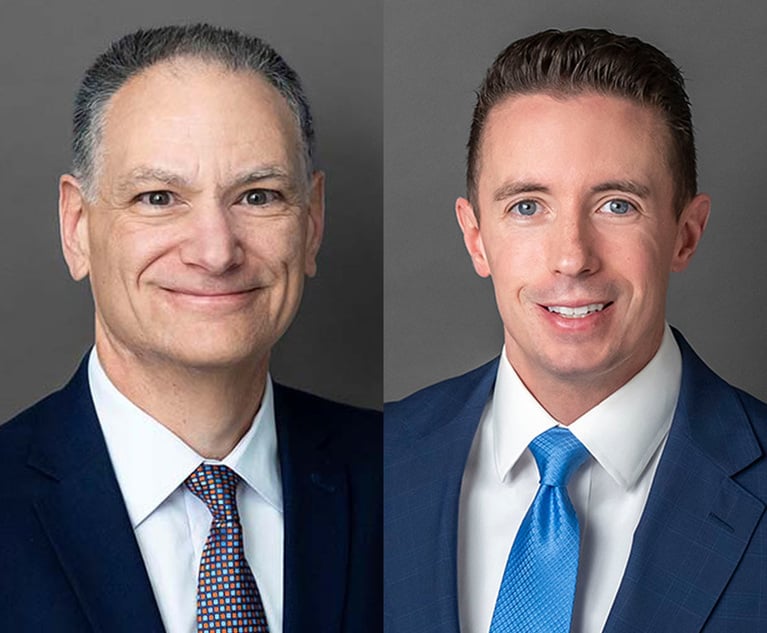Court Says Hospital Must Answer Whether It Knew Patient Was Registered Sex Offender
The Pennsylvania Superior Court has held that the Mental Health Procedures Act and the psychotherapist-patient privilege did not prevent the operators of a mental health facility from answering a request for admissions regarding their knowledge of a patient's sex offender status.
March 26, 2020 at 11:06 AM
4 minute read
 Photo: Shutterstock
Photo: Shutterstock
The Pennsylvania Superior Court has held that the Mental Health Procedures Act and the psychotherapist-patient privilege did not prevent the operators of a mental health facility from answering a request for admissions regarding their knowledge of a patient's sex offender status.
In a published March 25 opinion, a three-judge panel of the appeals court affirmed a Philadelphia trial judge's ruling in Pasquini v. Fairmount Behavioral Health System, granting plaintiff Brianna Pasquini's motion to strike objections to requests for admission and requiring defendants Fairmount Behavioral Health System and UHS of Fairmount to either admit or deny whether they knew a fellow patient accused of raping Pasquini was a registered sex offender in January 2016.
Pasquini had alleged that she was raped and assaulted by Montezz Hewlett when they were both patients at the defendants' facility, according to the opinion by Judge Correale Stevens. During discovery, Pasquini served the defendants with a request for admission that they knew Hewlett was a convicted sex offender in January 2016. The defendants objected, however, claiming that the information was privileged because Hewlett was a patient at their facility.
After Philadelphia Court of Common Pleas Judge Shelley Robins New sided with Pasquini, the defendants appealed, arguing that they were barred from answering the request for admission under Pennsylvania's psychotherapist-patient privilege and the Pennsylvania Mental Health Procedures Act.
But the Superior Court panel, consisting of Stevens and Judges Megan McCarthy King and Victor Stabile, agreed with New's rationale.
In her opinion, New wrote, "Mr. Hewlett's status as a registered sex offender does not qualify as the type of information the MHPA intended to make privileged. In fact, it directly counters the entire purpose of Megan's Law to make the identity of a known sex offender available to the public."
"Appellee is not asking for any information regarding the actual treatment of appellants' patient," New added. "Additionally, [she] did not ask for any private thoughts of Mr. Hewlett that may have been discussed with his psychotherapist or observations or analysis the psychotherapist made in relation to these discussions."
Stevens said the panel reached the same conclusion.
"The information appellee seeks does not require the exposure of confidential communications kept by appellants in Hewlett's treatment record; rather, the request for admission seeks to determine whether appellants had knowledge of an undisputed and publicly available fact— Hewlett's sex offender status," Stevens said. "As appellee notes, '[a] simple "admit" or "deny" sheds no light on when, why, where or from whom the information was (or was not) gleaned. In other words, [appellants'] actual answer to the request reveals nothing beyond their awareness of a publicly-promulgated fact. That is all.'"
Counsel for Pasquini, Joel Feller and Joshua Van Naarden of Ross Feller Casey in Philadelphia, said in a statement, "We are pleased that the Pennsylvania Superior Court has affirmed what was a very reasoned and well thought out opinion by Judge New in this important legal matter. With the appellate court affirming that mental health care providers cannot hide behind a claim of privilege when dealing with the knowledge of a patient's status as a registered sex offender, we now look forward to trial and seeking the justice that our client so desperately deserves."
Counsel for the defendants, Mark Merlini Jr. of Marks, O'Neill, O'Brien, Doherty & Kelly in Philadelphia, said in an email, "With regard your request for a comment, we are carefully considering the Superior Court's opinion and obviously disappointed with the decision. We are reviewing our appellate options at this time and will likely be appealing the decision."
This content has been archived. It is available through our partners, LexisNexis® and Bloomberg Law.
To view this content, please continue to their sites.
Not a Lexis Subscriber?
Subscribe Now
Not a Bloomberg Law Subscriber?
Subscribe Now
NOT FOR REPRINT
© 2025 ALM Global, LLC, All Rights Reserved. Request academic re-use from www.copyright.com. All other uses, submit a request to [email protected]. For more information visit Asset & Logo Licensing.
You Might Like
View All

Ozempic Defendants Seek to Shave 'Tacked On' Claims From MDL Complaint
3 minute read

Lawsuit Against Major Food Brands Could Be Sign of Emerging Litigation Over Processed Foods
3 minute readLaw Firms Mentioned
Trending Stories
- 1'Nation is in Trouble': NY Lawmakers Advance Bill to Set Parameters for Shielding Juror IDs in Criminal Matters
- 2Margolis Edelstein Broadens Leadership With New Co-Managing Partner
- 3Menendez Asks US Judge for Bond Pending Appeal of Criminal Conviction
- 4Onit Acquires Case and Matter Management Software Provider Legal Files Software
- 5As Nonprofits Plead for Answers, Dem AGs Plan Suit to Block Trump Funding Freeze
Who Got The Work
J. Brugh Lower of Gibbons has entered an appearance for industrial equipment supplier Devco Corporation in a pending trademark infringement lawsuit. The suit, accusing the defendant of selling knock-off Graco products, was filed Dec. 18 in New Jersey District Court by Rivkin Radler on behalf of Graco Inc. and Graco Minnesota. The case, assigned to U.S. District Judge Zahid N. Quraishi, is 3:24-cv-11294, Graco Inc. et al v. Devco Corporation.
Who Got The Work
Rebecca Maller-Stein and Kent A. Yalowitz of Arnold & Porter Kaye Scholer have entered their appearances for Hanaco Venture Capital and its executives, Lior Prosor and David Frankel, in a pending securities lawsuit. The action, filed on Dec. 24 in New York Southern District Court by Zell, Aron & Co. on behalf of Goldeneye Advisors, accuses the defendants of negligently and fraudulently managing the plaintiff's $1 million investment. The case, assigned to U.S. District Judge Vernon S. Broderick, is 1:24-cv-09918, Goldeneye Advisors, LLC v. Hanaco Venture Capital, Ltd. et al.
Who Got The Work
Attorneys from A&O Shearman has stepped in as defense counsel for Toronto-Dominion Bank and other defendants in a pending securities class action. The suit, filed Dec. 11 in New York Southern District Court by Bleichmar Fonti & Auld, accuses the defendants of concealing the bank's 'pervasive' deficiencies in regards to its compliance with the Bank Secrecy Act and the quality of its anti-money laundering controls. The case, assigned to U.S. District Judge Arun Subramanian, is 1:24-cv-09445, Gonzalez v. The Toronto-Dominion Bank et al.
Who Got The Work
Crown Castle International, a Pennsylvania company providing shared communications infrastructure, has turned to Luke D. Wolf of Gordon Rees Scully Mansukhani to fend off a pending breach-of-contract lawsuit. The court action, filed Nov. 25 in Michigan Eastern District Court by Hooper Hathaway PC on behalf of The Town Residences LLC, accuses Crown Castle of failing to transfer approximately $30,000 in utility payments from T-Mobile in breach of a roof-top lease and assignment agreement. The case, assigned to U.S. District Judge Susan K. Declercq, is 2:24-cv-13131, The Town Residences LLC v. T-Mobile US, Inc. et al.
Who Got The Work
Wilfred P. Coronato and Daniel M. Schwartz of McCarter & English have stepped in as defense counsel to Electrolux Home Products Inc. in a pending product liability lawsuit. The court action, filed Nov. 26 in New York Eastern District Court by Poulos Lopiccolo PC and Nagel Rice LLP on behalf of David Stern, alleges that the defendant's refrigerators’ drawers and shelving repeatedly break and fall apart within months after purchase. The case, assigned to U.S. District Judge Joan M. Azrack, is 2:24-cv-08204, Stern v. Electrolux Home Products, Inc.
Featured Firms
Law Offices of Gary Martin Hays & Associates, P.C.
(470) 294-1674
Law Offices of Mark E. Salomone
(857) 444-6468
Smith & Hassler
(713) 739-1250





